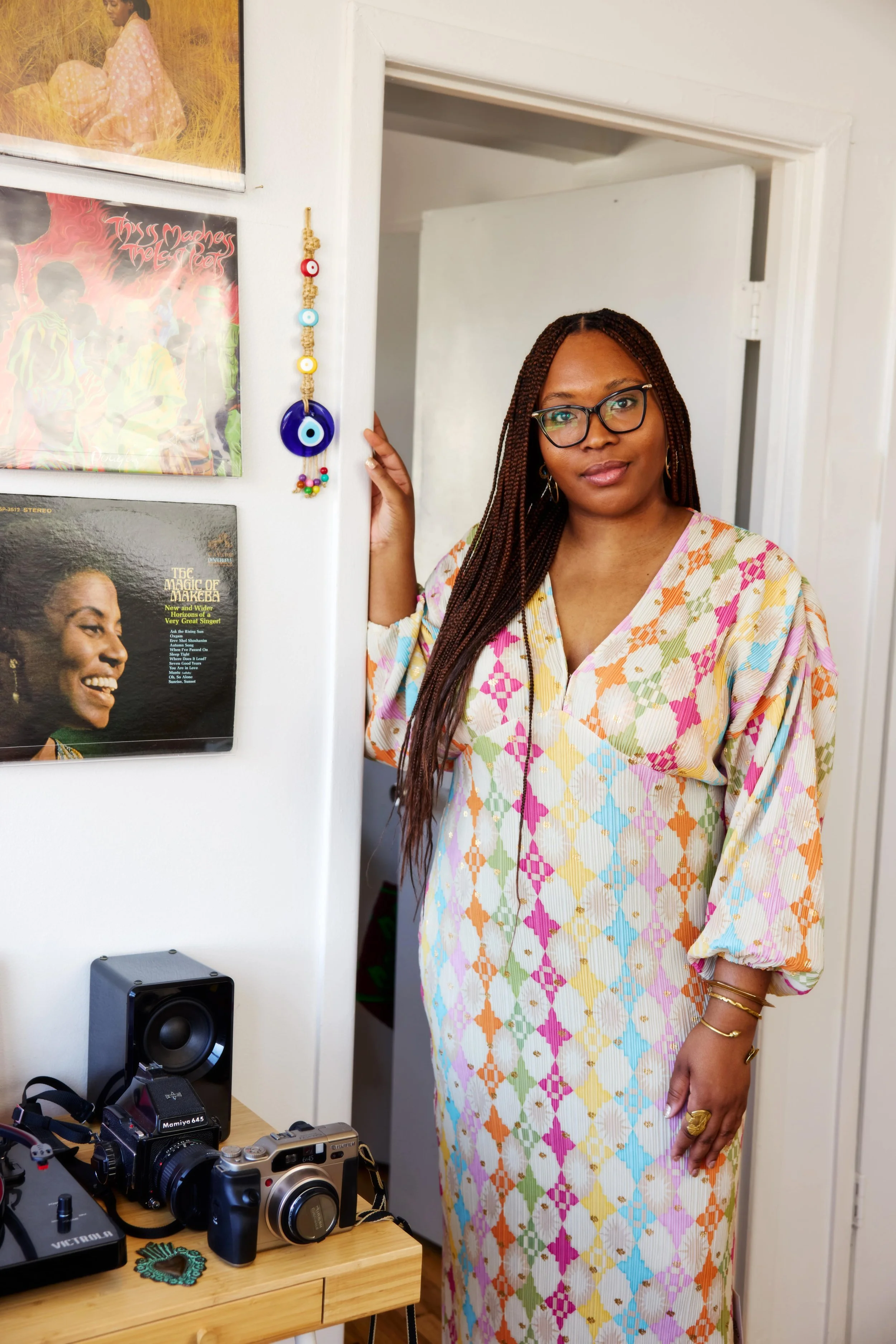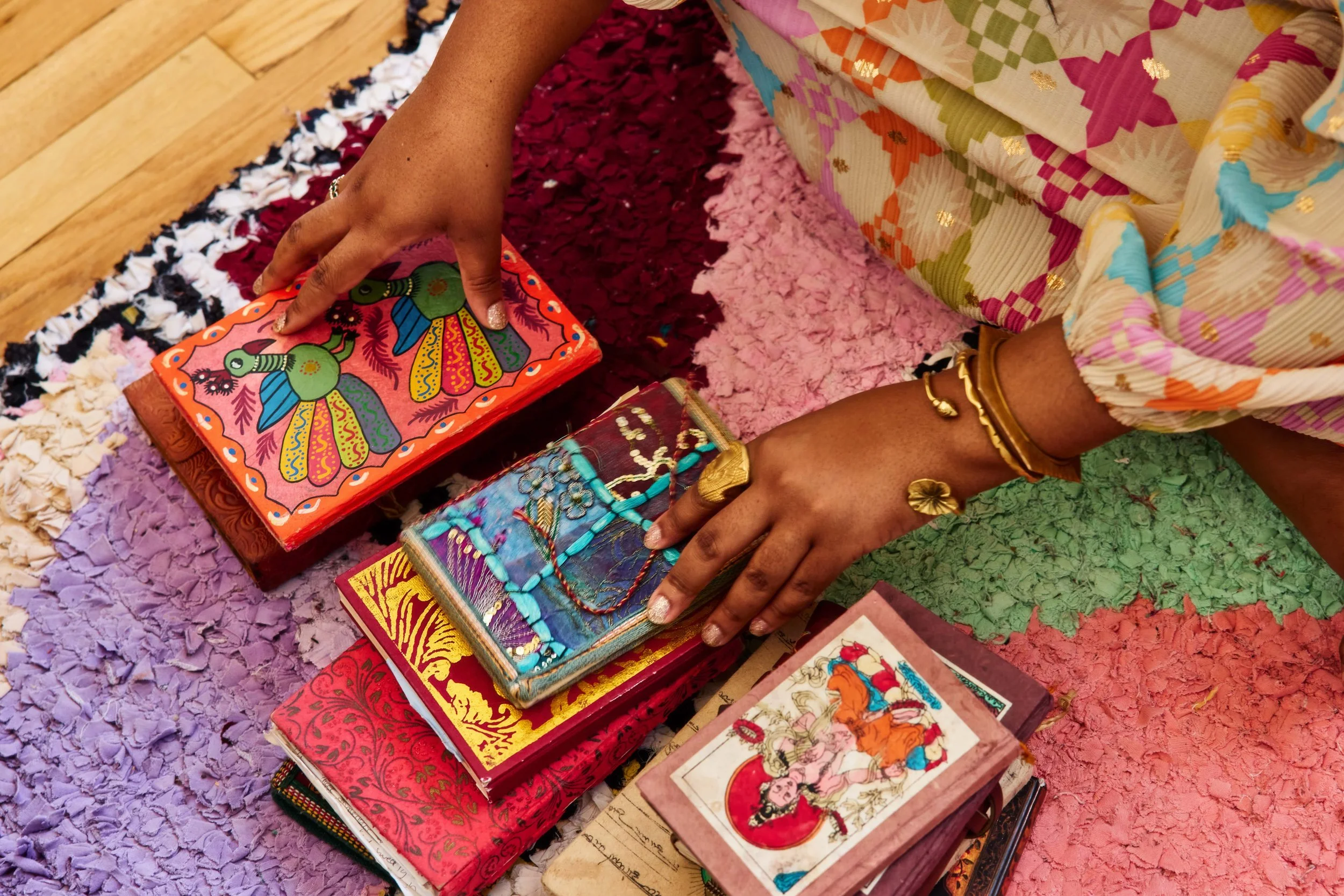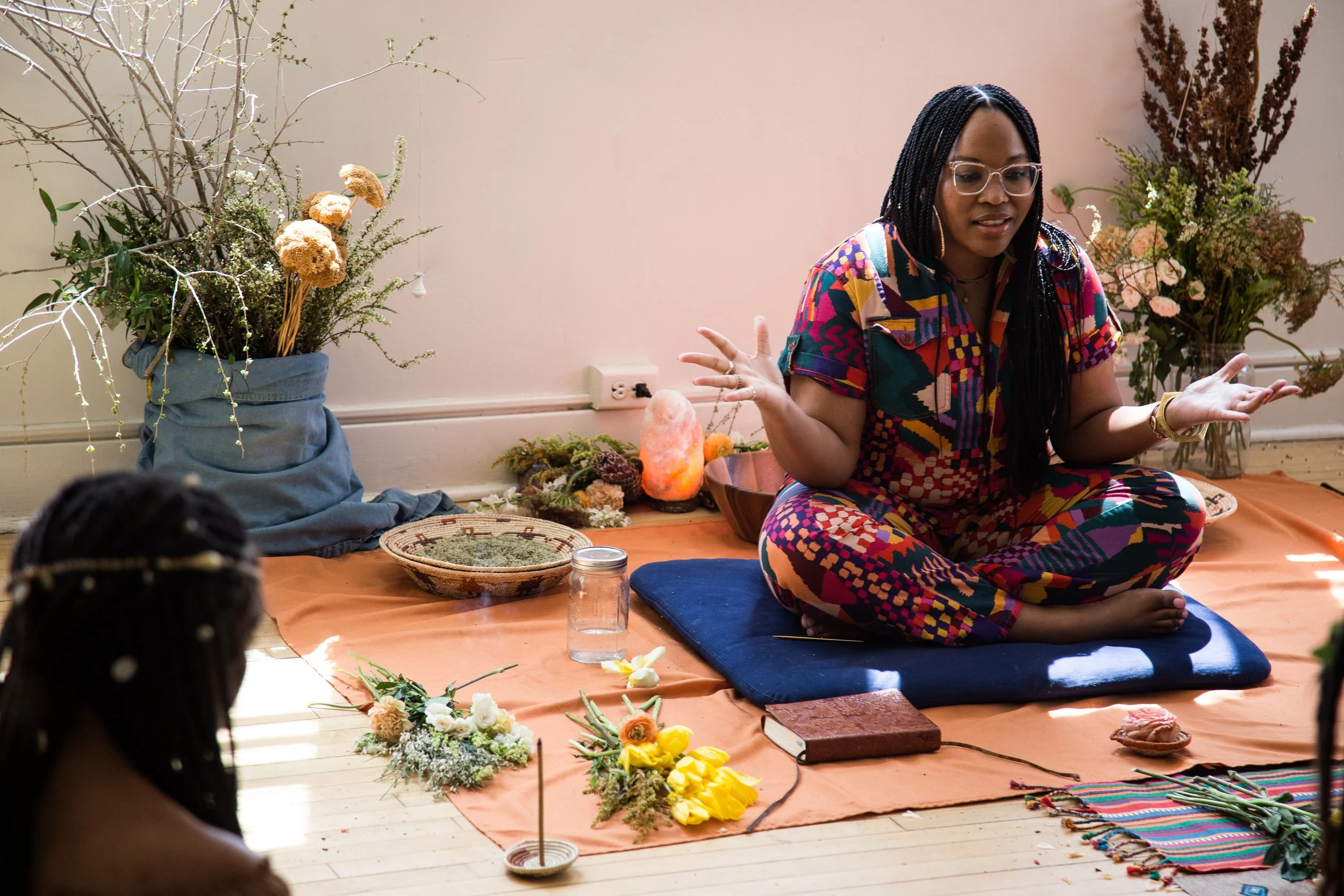“Our survival lies in us linking arms”: In Conversation with Giselle Buchanan
Giselle Buchanan’s inner world is teeming with great books, artistic examination, celestial becoming, and collective spirit. As a writer, visual artist, and educator, she has dedicated herself to bettering our community. Our conversation covers how she got here, the kinds of stories she wants to tell, and advice for fellow creatives.
NB: Tell me about your background and upbringing.
GB: My mother immigrated to the United States from Jamaica, and my father has roots in Texas and Louisiana, but I grew up in New York.
I’ve always been an artist. As far back as I can remember, there has never been a time when I wasn't making something, but I think I found writing in particular because of my mom. She gave me a journal and was like, ‘You have a lot of feelings, you can write it all in here. Take this book, you can write bad words if you want to – express yourself however you need to.’ My journal has always been a safe space. I feel like my mother gifted me that as a place I could always return to to anchor myself, to ask questions, to explore who I am as a person, my inner world.
Then in school, my writing was the thing teachers would compliment me most about. I guess I realized through them that it was a gift I had. People love to be good at something in school. I believe that affirmation fueled my already formed practice- just knowing that people recognized I was good at it.
It was a symbiotic relationship, you know? It makes you want to do more and write more and get better. So I remember, I think it was fourth grade. I won a poetry competition. Now I know it was rigged! It was just an anthology for middle school writers you could submit a poem to. It was really special for me to be in this hardcover book for a poem I wrote. For $40, anyone could be in the book if they wanted to, but I didn't know that. So it was a huge deal to me. I don't know if I still have that book. I think it's somewhere. But that was the first time I saw my poem in a book and my teacher Ms. Vincent was so proud.
I think that's how I started consistently writing poems. Then when I was 15, my poetry club teacher said, ‘You should enter this competition. You're an amazing writer.’ So I entered this youth poetry competition. I was being taught poetry by educators in preparation for the final performance and that was the first time I realized you can be a poet as a job. I didn't know that prior.
So that's my artistic DNA – discovering that I'm an artist through my community. I think that's how a lot of us come into the knowing that we're artists. Through sharing with others. It’s the reason I do the work I do. It's an important part of our self-discovery alongside what we name ourselves in our quiet moments.
“I feel like sometimes we can be disillusioned because of how much energy it takes to survive. Capitalism, structural inequity – there are forces that take so much joy, energy and wonder from us as people. I want to tell stories that feed our joy, our wonder, that feed our will to fight for life. That feed our memory that life is worth fighting for.”
NB: Can you tell me about your creative process when it comes to poetry? What do you draw inspiration from?
GB: I would say that right now, it's very sporadic. I really have to fight to carve out moments for my practice and if I'm not intentional about that, I can lose it a little bit. One way I carve out time for my practice is through my work. It’s a bit of a secret that my work also helps me!
When I'm in a workshop, sometimes I'm doing the writing alongside the participants, quietly. That helps me be accountable to myself while I'm being accountable to them. A lot of the poems that I've written this year have been because I was writing in my workshop.
Sometimes I will just open a notebook because I need to release, and nothing ‘good’ comes of that, but just showing up is how I practice, whether or not anyone could measure what comes out as ‘good’. I'm always trying to be consistent with my work and my writing.
As far as my inspirations, I love to read. I have so many poets who breathe life into my work and who remind me of the magic of words. I think that's how I started. Becoming a writer, in truth, is through being a reader. In fifth grade, my teacher commented on a paper I wrote saying, “I can tell that you're a reader because good readers make good writers.” That is true to my origins. I've always been a reader, and I'm constantly learning from all kinds of writers and their words, not only poetry but fiction, non-fiction, essays.
I also draw my inspiration from plants and the natural world. I love nature. If you read my work, there are lots of botanical references and I'm always talking about some celestial phenomenon. That's something that really feeds and inspires me – the beauty of the natural world and beauty in general.
I initially started writing in isolation. My practice began as a solidary thing, you know, something that I did and maybe shared with friends occasionally, shared in school occasionally. But I'll never forget the first time I went to a writing workshop. I didn't even know that they existed. I walked into a room with a table full of young people who were just like me who loved words. I was able to write alongside them, then read back what we just wrote to the group. It was something so special and so magical to me, that I kept that experience andmade the choice to be the steward of it in my own life, ever since. Writing in community changed my life and I just wanted to keep that energy flowing and share it with as many people as possible because I just felt how potent and how necessary storytelling is for our world.
So that's how I started doing my workshops. I started as a student. Then over the years I put my own spin on it, made it mine, made it a reflection of the work that I want to see in the world and also a reflection of the work that I make as an artist. My practice has kind of morphed to look like something different from what I initially learned. But, the core is still inspired by what I felt in that room 15 or so years ago, and the ways that it has shaped me. It taught me how beautiful language is and how beautiful it can be when we share language with other people.
NB: You are a visual artist as well. Can you speak on this part of your creative being?
GB: I would say that my visual art is more so for me. I don't really do anything outward facing with it these days. I have so many visual passions, like I love to paint. I went to school for Textile and Surface Design so that is a skill that I have that I don't really ever utilize, though one day I’d love to collaborate on a print collection or something. I love weaving on a loom. I love taking photos with films. I have a lot of visual practices that most people don’t know about because they’re just for me.
At times, I will mix my visual art and writing practice in the form of zines. It's a way I've been able to fuse those two parts of myself. I think I'm still exploring what it looks like to have a practice that is informed by all of my deep loves. I just took a filmmaking class and was able to learn how to use an analog movie camera from the fifties. I started a piece that I’m still working on. I hope to explore how to bring that into my practice as well.
I think the purpose my visual practice serves has been to let my inner child be free. To make a mess and capture beauty like she used to. I always had a film camera when I was little. A lot of my visual practices are remnants of my small self and all the ways that she loved to express. I still feel giddy and excited when I find a new watercolor tube that’s the perfect shade or when I get a new camera. It's like collecting toys, an adult version of the things that I used to play with.
NB: What stories do you want to tell?
GB: Well, first, I want to tell my story. Growing up, you're fighting for scraps, in terms of representation. And they never quite get it. They never really quite get to you. At least that's how I've felt. So as a writer, I feel like my role is to fill in the gaps. To fill in the space that could only be occupied by my particular voice, you know? For the people who resonate with me and my point of view. I think that’s important to me – for a young person who is maybe growing up in circumstances similar to mine – not really seeing their full self represented in media and books. Maybe they come across my words and I give voice and language to experiences they had no words for.
I think that’s what I endeavor to do. Obviously, there's nothing new under the sun, and there are poets and writers that I feel part of the lineage of who have given me language and reflected me, but I’ve found that those examples are so few. To be just one more person that fills in the gap for people, for the ones who come after me – that's what I would like to do.
I’d also love to tell stories of resilience. Of coming out on the other side of how heavy being a person can be. I’d love to tell stories of love and friendship and community. Stories that remind us how beautiful life is and fuel us to fight for life because of that beauty. I feel like sometimes we can be disillusioned because of how much energy it takes to survive. Capitalism, structural inequity – there are forces that take so much joy, energy and wonder from us as people. I want to tell stories that feed our joy, our wonder, that feed our will to fight for life. That feed our memory that life is worth fighting for.
NB: What advice do you have for creatives? Particularly creatives of color, writers, and artists that are still trying to come into their own ways of creation and being?
GB: My advice is to ignore the advice. To really learn how to hone your trust in yourself. To take what comes into your mind very seriously. What are the thoughts you have that won't leave you? What are the things you feel the world is missing? You have to become what I like to call a ‘citizen scientist’. As an artist, you are in the service industry. I believe I’m an artist that is in service to people. Everyone has their own way of doing that work, but for me personally, I believe that I'm a steward of my work and that work is for the hearts of people. When I think about it like that, then I know it's a service.
I’m trying to find where the need is that I can fill, and in order to do that, you have to be in the world. You have to always be observing. You have to be a witness and then through that witnessing you approach your work. So, I take my thoughts seriously. I hold it as true that my lens could be of service to the Olympic race of humanity. You just take your baton and you run with it as far as your life allows so that the next person can grab it. That's our only role. That's all we can really do is allow our lives to be used and our work to be used insofar as it helps us all move forward.
Learn how to trust your impulses. Learn how to believe in and hone your taste, and solidify your convictions. Only you know what you were put here to do.
I'm not even finished yet, you know? If I allowed people who didn't know the fullness of what I carried inside of myself to tell me what I was going to be, they wouldn't have gotten it right. Maybe they can see a glimpse of what you're good at, but no one knows what you contain except you. I think that my biggest piece of advice is to trust your own knowing.
NB: What does community mean to you?
GB: Community is so important to me, honestly. I think that we see ourselves fully through the eyes of those who love us. We know who we are because of who has come before. We are communal people designed for relating. The structures that are put in place for the profit of a few that extract the labor of the many, design this world to take us away from community, and we have to fight for it.
It's so important for our wellness and how we learn ourselves as creative beings. I'm certain that I would have figured out I was a writer on my own. I would have figured that out. But I can’t downplay how important it was to my becoming that the people in my life saw me as one and mirrored that back to me. I always say community adjusts our distorted mirrors. Sometimes our minds are inhospitable places to exist in. We get told a lot of lies from society and we internalize them as stories we perpetuate within ourselves. I do believe that community plays a role in adjusting our distorted mirrors and helping us see who we truly are when we are lost in the lies of the world, which I know at times I can be.
Oftentimes, my community reminds me of who I am and reflects me back to myself in my truest light. I believe that's what we do for each other. We have to fight for it. It's so important to me and to us as communal beings. We rely on each other. Our survival is linked. Our survival lies in us linking arms. ✾







